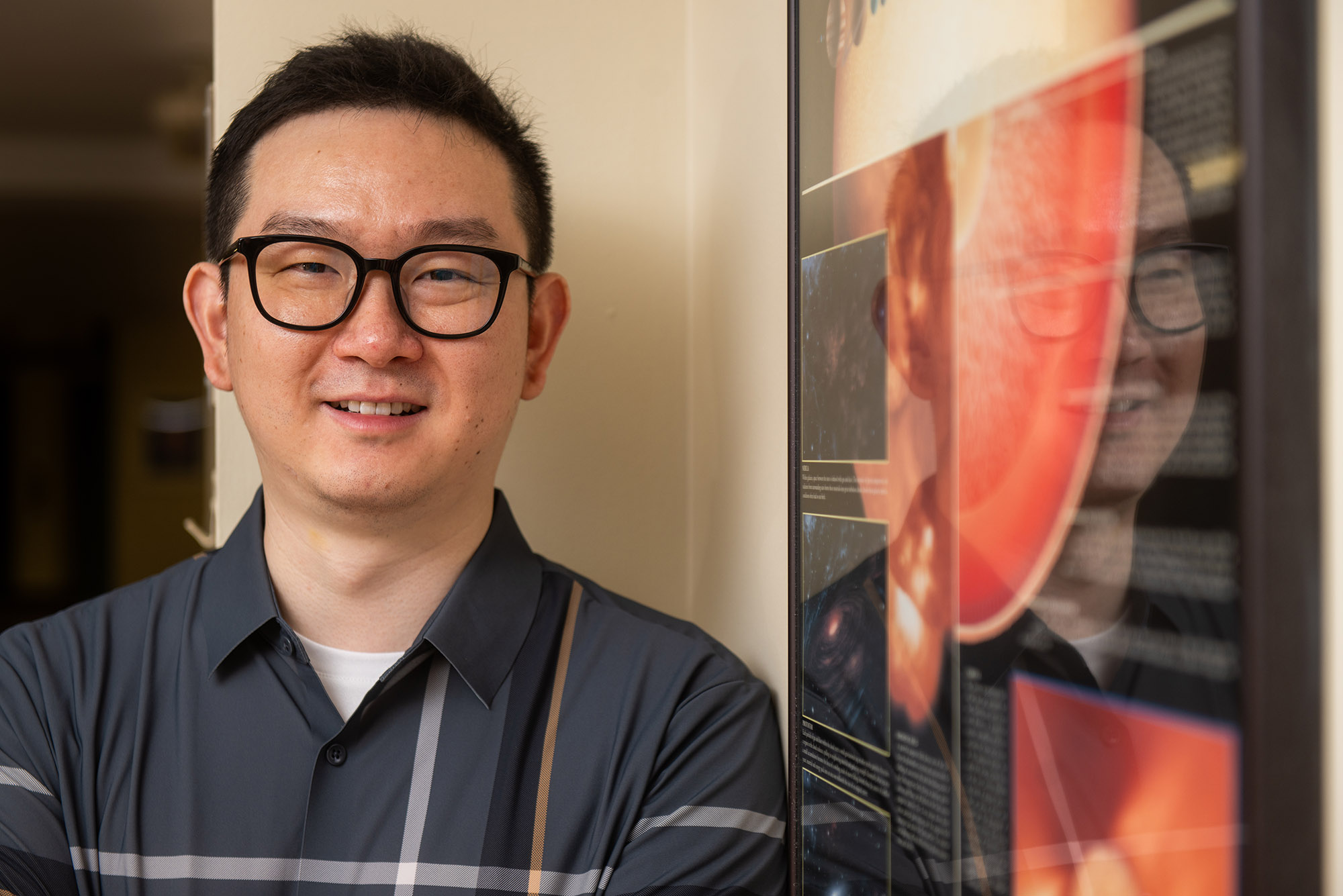BU Astronomer Wins Department of Energy Early Career Research Award
Chuanfei Dong’s study of plasma could help answer questions about solar flares, life on other planets, the history of Mars, and carbon-free fusion energy

Boston University astronomer Chuanfei Dong will use funding from the Department of Energy to advance his research on plasma.
BU Astronomer Wins Department of Energy Early Career Research Award
Chuanfei Dong’s study of plasma could help answer questions about solar flares, life on other planets, the history of Mars, and carbon-free fusion energy
Plasma—the state of matter that occurs when gases are superheated—makes up more than 99 percent of the observable universe. Therefore, better understanding how plasma behaves can advance our understanding of the universe. Boston University astronomer Chuanfei Dong is working to untangle the mysteries of plasma, and his efforts were recently recognized with a prestigious award from the US Department of Energy (DOE). Dong, a BU College of Arts & Sciences assistant professor of astronomy, is among 93 scientists selected by the DOE for its Early Career Research Program. The program was established in 2010 to bolster the nation’s scientific workforce by supporting exceptional researchers at the outset of their careers, when many scientists do their most formative work.
The award comes with $875,000 in grant funding, which Dong will use to support a research project aimed at better understanding the flow of energy in plasma turbulence. It will allow him to hire a graduate student and a postdoctoral researcher to help him run and analyze computer simulations. The new research will expand on his recent work (published last year in the journal Science Advances) to further explore the role of magnetic field lines in heating and accelerating particles in turbulent plasmas.
Dong is the fourth BU researcher to receive a DOE Early Career Research award; past recipients are Indara Suarez and Wanzheng Hu, both CAS assistant professors of physics, and Sahar Sharifzadeh, a College of Engineering associate professor of electrical and computer engineering.
“I feel very lucky, because it’s highly competitive,” Dong says of receiving the DOE award, adding that he appreciates the supportive comments from panelists who reviewed his application. “All the responses I got were very positive. They all evaluated me as a leader in computational plasma physics.”
Plasma is rare on Earth, but abundant in the universe around us—making up stars, nebulae, and much of the interstellar and intergalactic medium (the matter that fills the space between stars and galaxies). Because plasmas are made of electrically charged particles, they conduct electricity and respond to magnetic fields, which makes their behavior complex and often puzzling.
Dong’s new research focuses on magnetic reconnection—the breaking and reconnecting of magnetic field lines in a plasma, a process that converts magnetic energy to plasma kinetic and thermal energy. Magnetic reconnection, he says, is a key process in triggering solar flares and coronal mass ejections (bursts of magnetic field and plasma), which can disrupt power grids and communications systems on Earth.
The DOE funds research in plasma physics because of its interest in fusion energy. Fusion occurs in stars (which are composed of plasma) when two nuclei combine to form a new atom, releasing enormous amounts of energy. The DOE has worked for decades to re-create that process in its labs, with the hope of discovering a carbon-free energy source for use on Earth. Dong’s research may bring the DOE a step closer to that goal.
Dong, who had been a staff scientist at the Princeton Plasma Physics Laboratory, a DOE national laboratory managed by Princeton University, joined the BU faculty in January 2023.
“I learned a lot from my teachers when I was a student,” he says. “I feel it’s my responsibility to pass that knowledge to the next generation. At a DOE national lab, I could mentor students, but I couldn’t teach.”
Dong taught an introductory astronomy course about the solar system during the 2023 spring semester, and this fall, he’ll teach planetary physics.
Another perk of moving to BU, says Dong, is the flexibility to follow his research interests, even those that don’t align with DOE priorities.
“I have very, very broad interests,” he says, citing his involvement in a range of research projects: NASA’s MAVEN mission, which aims to understand how Mars lost much of its atmosphere billions of years ago; the joint European and Japanese BepiColombo mission to study Mercury; and a study of the TRAPPIST-1 system, a recently discovered system of Earth-sized planets orbiting a star 39 light-years from Earth.
Because plasma makes up so much of the universe, Dong says, he has many opportunities to conduct interdisciplinary research. He has, for example, combined his knowledge of space plasma physics with other scientists’ knowledge of astrobiology to study the potential for life on exoplanets. In 2017, he led a paper raising doubts that the exoplanet Proxima Centauri b is capable of retaining an atmosphere that would support surface-based intelligent life.
The promise of such collaborations is what drew Dong to the astronomy department at BU. Roughly half of the department’s faculty, he says, specialize in space physics (the study of solar wind, planetary atmospheres, and other phenomena within our solar system), while the other half specialize in astronomy (the study of the physics of outer space—supernovae, black holes, etc.).
“My research covers both space physics and astronomy,” he says. “I hope I can build a bridge between the two divisions and facilitate collaboration on interdisciplinary research.”

Comments & Discussion
Boston University moderates comments to facilitate an informed, substantive, civil conversation. Abusive, profane, self-promotional, misleading, incoherent or off-topic comments will be rejected. Moderators are staffed during regular business hours (EST) and can only accept comments written in English. Statistics or facts must include a citation or a link to the citation.